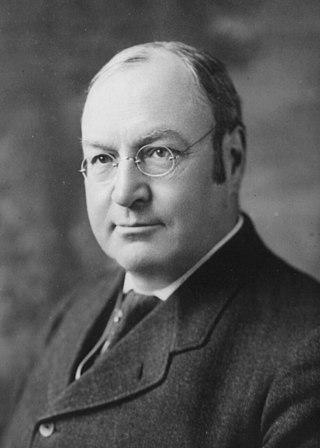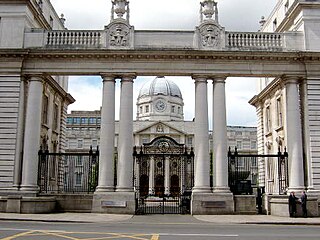Related Research Articles

The House of Commons is the lower house of the Parliament of the United Kingdom. Like the upper house, the House of Lords, it meets in the Palace of Westminster in London, England. The House of Commons is an elected body consisting of 650 members known as members of Parliament (MPs). MPs are elected to represent constituencies by the first-past-the-post system and hold their seats until Parliament is dissolved.

The Parliament of the United Kingdom is the supreme legislative body of the United Kingdom, and may also legislate for the Crown Dependencies and the British Overseas Territories. It meets at the Palace of Westminster, London. It possesses legislative supremacy and thereby ultimate power over all other political bodies in the UK and the overseas territories. While Parliament is bicameral, it has three parts, consisting of the sovereign (King-in-Parliament), the House of Lords, and the House of Commons. In theory, power is officially vested in the King-in-Parliament. However, the Crown normally acts on the advice of the prime minister, and the powers of the House of Lords are limited to only delaying legislation; thus power is de facto vested in the House of Commons.

The Sixteenth Amendment to the United States Constitution allows Congress to levy an income tax without apportioning it among the states on the basis of population. It was passed by Congress in 1909 in response to the 1895 Supreme Court case of Pollock v. Farmers' Loan & Trust Co. The Sixteenth Amendment was ratified by the requisite number of states on February 3, 1913, and effectively overruled the Supreme Court's ruling in Pollock.

The Parliament Acts 1911 and 1949 are two Acts of the Parliament of the United Kingdom, which form part of the constitution of the United Kingdom. Section 2(2) of the Parliament Act 1949 provides that the two Acts are to be construed as one.

The Parliament of Canada is the federal legislature of Canada, seated at Parliament Hill in Ottawa, and is composed of three parts: the King, the Senate, and the House of Commons. By constitutional convention, the House of Commons is dominant, with the Senate rarely opposing its will. The Senate reviews legislation from a less partisan standpoint and may initiate certain bills. The monarch or his representative, normally the governor general, provides royal assent to make bills into law.

James Schoolcraft Sherman was an American politician who was a United States representative from New York from 1887 to 1891 and 1893 to 1909, and the 27th vice president of the United States under President William Howard Taft from 1909 until his death in 1912. He was a member of the interrelated Baldwin, Hoar, and Sherman families, prominent lawyers and politicians of New England and New York.
Acts of Parliament, sometimes referred to as primary legislation, are texts of law passed by the legislative body of a jurisdiction. In most countries with a parliamentary system of government, acts of parliament begin as a bill, which the legislature votes on. Depending on the structure of government, this text may then be subject to assent or approval from the executive branch.

The Rajya Sabha, constitutionally the Council of States, is the upper house of the bicameral Parliament of India. As of 2023, it has a maximum membership of 250, of which 238 are elected by the legislatures of the states and union territories using single transferable votes through open ballots, while the president can appoint 12 members for their contributions to art, literature, science, and social services. The total allowed capacity is 250 according to article 80 of the Indian Constitution. The current potential seating capacity of the Rajya Sabha is 245, after the Jammu and Kashmir (Reorganisation) Act, 2019, the seats came down to 245. The maximum seats of 250 members can be filled up at the discretion and requirements of the house of Rajya Sabha.

The Speaker of the House of Commons is the presiding officer of the House of Commons, the lower house and primary chamber of the Parliament of the United Kingdom. The current speaker, Sir Lindsay Hoyle, was elected Speaker on 4 November 2019, following the retirement of John Bercow. Hoyle began his first full parliamentary term in the role on 17 December 2019, having been unanimously re-elected after the 2019 general election.

The Committee on Rules, or more commonly, the Rules Committee, is a committee of the United States House of Representatives. It is responsible for the rules under which bills will be presented to the House of Representatives, unlike other committees, which often deal with a specific area of policy. The committee is often considered one of the most powerful committees as it influences the introduction and process of legislation through the House. Thus it has garnered the nickname the "traffic cop of Congress". A rule is a simple resolution of the House of Representatives, usually reported by the Committee on Rules, to permit the immediate consideration of a legislative measure, notwithstanding the usual order of business, and to prescribe conditions for its debate and amendment.

The Parliament of Southern Ireland was a Home Rule legislature established by the British Government during the Irish War of Independence under the Government of Ireland Act 1920. It was designed to legislate for Southern Ireland, a political entity which was created by the British Government to solve the issue of rising Irish nationalism and the issue of partitionism, while retaining the whole of Ireland as part of the United Kingdom.
An upper house is one of two chambers of a bicameral legislature, the other chamber being the lower house. The house formally designated as the upper house is usually smaller and often has more restricted power than the lower house. A legislature composed of only one house is described as unicameral.

The Parliament Act 1911 is an Act of the Parliament of the United Kingdom. It is constitutionally important and partly governs the relationship between the House of Commons and the House of Lords, the two Houses of Parliament. The Parliament Act 1949 provides that the Parliament Act 1911 and the Parliament Act 1949 are to be construed together "as one" in their effects and that the two Acts may be cited together as the Parliament Acts 1911 and 1949.

The Lord Speaker of the House of Lords is the presiding officer, chairman and highest authority of the House of Lords in the Parliament of the United Kingdom. The office is analogous to the Speaker of the House of Commons: the Lord Speaker is elected by the members of the House of Lords and is expected to be politically impartial.
In the Westminster system, a money bill or supply bill is a bill that solely concerns taxation or government spending, as opposed to changes in public law.

The 39th United States Congress was a meeting of the legislative branch of the United States federal government, consisting of the United States Senate and the United States House of Representatives. It met in Washington, D.C., from March 4, 1865, to March 4, 1867, during Abraham Lincoln's final month as president, and the first two years of the administration of his successor, Andrew Johnson.

The State Great Khural is the unicameral parliament of Mongolia. It is located in the Government Palace.
A committee of the whole is a meeting of a legislative or deliberative assembly using procedural rules that are based on those of a committee, except that in this case the committee includes all members of the assembly. As with other (standing) committees, the activities of a committee of the whole are limited to considering and making recommendations on matters that the assembly has referred to it; it cannot take up other matters or vote directly on the assembly's business. The purpose of a committee of the whole is to relax the usual limits on debate, allowing a more open exchange of views without the urgency of a final vote. Debates in a committee of the whole may be recorded but are often excluded from the assembly's minutes. After debating, the committee submits its conclusions to the assembly and business continues according to the normal rules.

An Act of Parliament in the United Kingdom is primary legislation passed by the UK Parliament in Westminster, London.

The Judicial Commission of Indonesia was established as a consequence of the third amendment to the Constitution of Indonesia ratified by the Indonesian People's Consultative Assembly on 9 November 2001. The Commission's duty is to monitor the performance of judges, advise the House of Representatives on judicial appointments and review community complaints about the behavior and fairness of presiding judges.
References
- ↑ Jennings, Sir Ivor. (1969). Parliament. Cambridge UP, 60.
- ↑ Shirur, Rajani R. (1997). World Constitutions. Sterling Publishers, 93.
- ↑ See W.T. Stead, The Review of Reviews, no. 257, May 1911, p. 428
- ↑ Selection of amendments